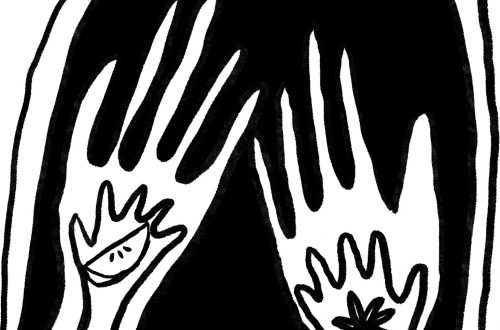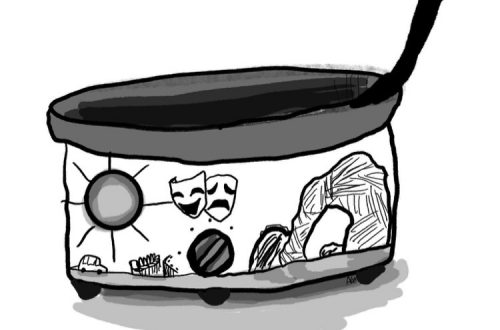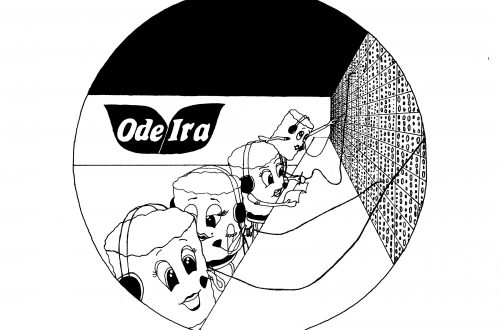by Ellen Levitt
Ellen’s essay appears in episode 25 of The Dirty Spoon Radio Hour.
Working in a school cafeteria has its pros and cons, and I ought to know.
Many years ago in my first year at college, I worked fall semester at our cafeteria, followed by spring term at another cafeteria across campus. Most of the time my job was serving food, but I also cleaned, transported supplies to food stations (citrus fruits to the juice bar, for example) and helped maintain the frozen yogurt machines. Besides being paid minimum wage, I also received a few meals per week and met some nice people.
Many college students need to work a job (or two or three) while at school. On-campus jobs are attractive because they are easy to obtain, often within walking or biking distance from dorms and classrooms and can be tied into financial aid packages. When I was campaigning for a student government position, I schmoozed with students who were waiting on the line for their meals. At the same time, I realized that some students looked down on someone like me, someone who took a less-than-glamorous campus job.
Back then, my fellow workers and I were required to wear aprons, gloves and hats, and observe various cleanliness protocols. Today, with the Covid-19 pandemic and concerns about social distancing, cafeterias must take additional steps to ensure the safety of students as well as themselves. Caf workers are considered essential workers, which shows them more respect than before, but also creates a job position fraught with worry and additional steps.
Today, with the Covid-19 pandemic and concerns about social distancing, cafeterias must take additional steps to ensure the safety of students as well as themselves.
Take Melissa for example.
Melissa is a long-time friend of my older daughter Jessica; they’ve known each other since nursery school. Melissa has worked at the cafeteria at SUNY (State University of New York) Oswego.
When she’s in the cafeteria, Melissa serves food, works at the deli station, washes dishes and big pots, she says, although most of her shifts are just serving food.
Even though the work hasn’t always been easy, she has appreciated certain aspects of the job: “I met a lot of great people which made work a lot more enjoyable,” she says. “The dining hall was connected to my residence hall, which made it very convenient to show up to work. Every dining hall serves something a little different and after we finished our shifts, the boss would let us take whatever food was left over. And there were many opportunities to pick up shifts which allowed me to make more money per week. What I disliked about the job? Serving food over an oven gets really hot and I started sweating a lot. Also, in this dining hall most of the time the line was long, and it would be hard to ever catch a break.”
“Most of the time the line was long, and it would be hard to ever catch a break.”
As far as cleanliness goes, Melissa says the supervisors and managers are very strict. “Before we would start our shift, we had to wash our hands, put on gloves, and put on a hair net. For (some) guys they had to put on a beard net.”
“I interacted pretty well with all of my coworkers. There were some I knew on a personal level, and others I would just greet hello and goodbye. As for my supervisors, I was comfortable enough to hold a conversation with them and ask them for anything I needed. In general the whole staff was very nice and they always made sure we were working in a safe and comfortable environment.”
But now things have changed somewhat. Social distancing affects this kind of job, she says, because they’re not allowed to physically eat in the dining hall anymore.
Instead, Melissa explains, they have a pickup system where you order off an app called GET and the order is sent to the dining hall. The workers pack up everything into a bag and then notify you when the order is ready for pickup. “This way we don’t possibly eat next to someone who has COVID 19. Essentially there are not as many workers needed and all the stations are not being utilized, which results in fewer jobs for students. And of course, we have to wear masks now which I think makes it harder to hear and understand people.”
Michal is another friend of my daughter Jessica, and they worked together in the kitchen at their sleep away camp two years ago: slicing meats, helping to cook meals, cutting up vegetables, cleaning and more. Michal also worked at a college cafeteria at SUNY Oneonta, making sandwiches and wraps. She mentioned that some students would be picky about their orders and she had to be patient. She did get to eat some of the food at the cafeteria, but she has become a vegan and has less choices because of that. But she would eat available salads after her shifts and certain sandwiches. Both Melissa and Michal mentioned that they had to be on their feet a lot during work, which sometimes wasn’t easy.
Essentially there are not as many workers needed and all the stations are not being utilized, which results in fewer jobs for students.
Students such as Melissa and Michal are just two of the thousands of student cafeteria workers whose stories are rarely highlighted when we discuss food, or college campuses, or even the risks of coronavirus to workers, since we usually focus on doctors and nurses, EMTs and even bus drivers.
They are working jobs that are necessary for the smooth running of our schools and universities.
The Covid-19 pandemic and its fallout have made a not-so difficult nor dangerous job into one fraught with dangers. Cafeteria workers in the past have faced some physical dangers such as cuts and bruises; cooking staff faced bigger issues such as burns and knife wounds. But now there is another layer of threat, one that’s almost invisible.
Now, most college students are either picking up their pre-ordered meals, or getting their pre-ordered meals delivered to the front desks of their dorms. Kitchen staff is mostly out-of-sight. Interactions between the serving staff and the students has been greatly minimized.
In fact, college cafeterias and school cafeterias in general are going to need additional funding in order to prepare and maintain safety standards for the pandemic.
As an article in The Atlantic points out, “The Silent Suffering Of School Cafeteria Workers” is a serious matter, and these workers need to be protected from Covid-19, not just from knife slices and oil burns. And a New York Times article that covered workplace condition problems faced by cafeteria workers points out that poor ventilation and high temperatures (near ovens and sinks, in particular) are now even tougher to deal with, when cafeteria workers are wearing masks.
Cafeteria workers like Melissa and Michal need masks, gloves, and many other safety items. They shouldn’t feel like they are putting themselves at greater risk just so they can serve meals to students. Too often these workers are overlooked and underappreciated. They need to be respected and protected.
“It is a great first job to have on campus,” Melissa says, “It taught me time management, responsibility, and having the ability to handle work, classes and the clubs I am involved in on campus.”
What will this “first campus job” look like in the future? How will it change the lives of other workers like Melissa and Michal?
Right now, the cafeteria lines are empty. For how long, none of us can answer.

About Ellen Levitt
Ellen Levitt is a veteran teacher and writer, and a lifelong resident of Brooklyn, New York.





